Lacey Louwagie's Blog, page 13
July 7, 2014
On the End of 100 Happy Days
I hope that I still have many happy days to come, but this last weekend marked the official end of my participation in  the #100happydays meme. The meme challenges you to take one picture a day of something that makes you happy, and post it to your network of choice — Facebook, Instagram, Twitter, Tumblr, etc.
the #100happydays meme. The meme challenges you to take one picture a day of something that makes you happy, and post it to your network of choice — Facebook, Instagram, Twitter, Tumblr, etc.
On the surface, this may not seem to have much to do with writing — but I undertook the challenge for the same reasons that I’ve taken up various writing practices in my life, from gratitude and prayer journals to Morning Pages. I thought being “on the lookout” for those happy moments would make it easier for me to notice them, make me more present to them, and allow me to have a deeper appreciation for the story of my life.
The experience was not particularly illuminating to me, and I don’t think it did what I wanted it to, either. I did notice that most of the things that make me really happy are things I can’t really photograph, or that I don’t feel comfortable or can’t share with the world. Happy, unphotogentic moments over the past few months included things like
Making my last car payment;
Overcoming hurdles in a confidential project my husband and I have been working on; and
Receiving an email from my best friend.
Then there were the many happy moments that I didn’t catch on camera because, well, I was too busy being present in that moment. It was only at the end of the day that I wished I’d remembered to take a photo. Photos are just not my usual mode of expression or remembrance.
Mostly, I defaulted to images of my pets and inanimate objects.
There were also times when #100happydays felt like a downright lie or some kind of cruel joke. I’ve had some of the worst days of my year in these past few months; I’ve awakened in the middle of the night terrified about the safety of someone I love because she “crossed” the wrong person. And then there were all the tears when I realized my cat was dying, and the grieving that followed.
I considered dropping the project then. I wanted to scream, these are not happy days! But I’m a “finisher” by nature, and part of me said those were the days when I most needed to grab and notice the happy moments. So I did, although I wondered whether it might have been healthier to just let myself sink into my sadness for a few weeks, which is what I really longed to do.
#100happydays did not help me get through the hard times; instead, it made me feel like I was plastering a fake smile on my face to go out in public. What did help me get through those times, and what is still helping me, was writing. Letters to my cat, pages in my journals, Livejournal entries, emails to my friends, a card for my vet. I cried almost every time I wrote about Phoebe, but they were the right kinds of tears — cleansing, and honoring of the love I had for her. I cringed when I took happy days photos and did not, in fact, feel happy. Although perhaps those tiny photographed moments did remind me that I was losing one blessing in my life, not all of them. It is important to be grateful for what remains, and I am.
I still think #100happydays is a worthwhile endeavor, but it just wasn’t for me. There’s a saying that the writer “lives twice” — once in the moment, and once while writing about it. Some moments I have to live more than twice to fully process. But I didn’t get this same satisfaction from capturing my life in photos. Rather than “living twice,” I felt so distracted about how I could get a good photo, or so annoyed at myself for forgetting to take one after the happy moment was gone, that I felt more like I was “living half” than “living twice.”
Still, I am glad that it gave me a few last photos of Phoebe that I had no idea at the time would be her last. But I’m also pretty glad it’s done.
July 1, 2014
5 Things Ryan Eggold Doesn’t Know About Writers
When I was in my parents’ bathroom over the weekend, I picked up the copy of Women’s Health hanging out by the toilet and read 5 Juicy Questions for Ryan Eggold. Here’s his response to question #4:
What’s one profession that you find extremely attractive?
A writer. I don’t think I’ve ever dated a writer, and I have this fantasy that I’m going to marry one; I have no idea why. It’s something about sitting at your computer writing with glasses on. I’m into it.
Cue eyeroll. I’m glad stereotypes about cute, geeky girls are alive and well, and that writers are still properly romanticized, although I think what Ryan is actually looking for is the Naughty Librarian. But since he’s going to “marry one” someday (in his fantasy), here are five things about loving a writer that he ought to know.
We don’t all wear glasses. Some of us wear contacts. Some of us have perfect vision. There is no “dress code” for being a
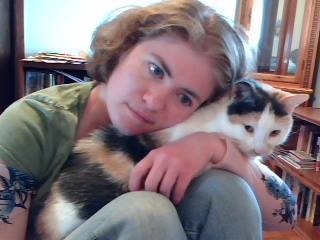
This is what a writer looks like. Glasses optional. Cat required.
writer, so if you like girls with glasses, date girls with glasses. A girl wearing glasses doesn’t mean she’s smart or a writer. It means she doesn’t see all that well. And she’ll probably pass her substandard vision genes onto your kids.
Writing doesn’t pay well. Maybe money doesn’t matter much and you’re cool with that. Or maybe you had no idea and thought we were all rolling in it just because J.K. Rowling is worth $1 billion. Or maybe you like the idea of your wife making less money than you, or of “supporting” her. Which is gross.
Becoming proficient at writing takes time. Your writer wife just might spend less time adoring you than other women would. She’ll probably spend less time doing dishes and vacuuming the floor. She’ll pop out fewer of your children. She’ll be so possessive of her writing time that she’ll begin to see everything in her life as a distraction and in competition with it. That includes you.
Writing is a solitary act. We want to be alone a lot, preferably at home. Get used to entertaining yourself, and also attending social functions without your glasses-sporting geeky trophy wife on your arm.
Generally speaking, we spend less time on our appearance than other women. We’re far more concerned with minds than with bodies, and with ideas than with clothes or makeup. Your writer wife may stay in her flannel pajamas all day. Her glasses may be five years old and out of fashion because she doesn’t have insurance that covers vision. She will probably feel like an imposter every time she wears makeup. Her hair will be wild. She might be a tad overweight. So take whatever you’re picturing in your fantasy, take off the makeup, replace the cute, tight jeans with yoga pants, and the fitted t-shirt with a hoodie with frayed strings. And then, if you really love your wife the writer, she will look good to you anyway — because she will be herself.
Look, it’s wonderful to be a writer who is beloved by a spouse. My husband loves me as a writer, because he understands that being a writer is a huge part of who I am. But he loves me first, not some delusional fantasy of some hawt writer chick who doesn’t know she’s sexy because she has glasses on.
There’s probably a reason Ryan has “never dated a writer.” We have pretty good bullshit detectors.
June 25, 2014
Making the Invisible Visible Releases Today
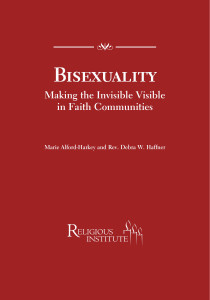 A little over a year ago, I traveled to New York to attend a colloquium about the intersection of bisexuality and faith. The Religious Institute was calling together bisexual ministers and people of faith from diverse religious backgrounds to start a discussion that would ultimately inform their creation of Bisexuality: Making the Invisible Visible in Faith Communities, a guidebook for congregations to use in welcoming, affirming, and ministering to bisexual people. One of the women spear-heading the project emailed me several times before officially inviting me to the colloquium, mentioning that my name “kept coming up” in relation to Catholicism and bisexuality. I laughed and told her it was because I was the only Out Catholic Bisexual in the World. (Luckily, that isn’t true.)
A little over a year ago, I traveled to New York to attend a colloquium about the intersection of bisexuality and faith. The Religious Institute was calling together bisexual ministers and people of faith from diverse religious backgrounds to start a discussion that would ultimately inform their creation of Bisexuality: Making the Invisible Visible in Faith Communities, a guidebook for congregations to use in welcoming, affirming, and ministering to bisexual people. One of the women spear-heading the project emailed me several times before officially inviting me to the colloquium, mentioning that my name “kept coming up” in relation to Catholicism and bisexuality. I laughed and told her it was because I was the only Out Catholic Bisexual in the World. (Luckily, that isn’t true.)
The book features a short excerpt from my essay about being bisexual that was published in Unruly Catholic Women Writers, as well as a link to my article for DignityUSA. It was writing about these issues that brought the Religious Institute to me, proving that what we write “for free” can pay off in ways we hadn’t imagined.
June 23, 2014
Indie Book Review: Unforgettable by Paulette Bates Alden
Now that I’ve officially entered the realm of indie publishing, I’ve decided to showcase high-quality self-published offerings when I come across them. These are the books that are slowly eroding the stigma attached to self-publishing, so they deserved to be noticed! Below is my review of Unforgettable: Short Stories by Paulette Alden, a writer from my home state of Minnesota. Genre is short stories and literary fiction. The quality is on-par with what you would expect from a “traditional” press. Unforgettable: Short Stories by Paulette Bates Alden
Unforgettable: Short Stories by Paulette Bates Alden
My rating: 4 of 5 stars
I’ve read impeccable, independently published poetry (Sister) and non-fiction (Round and Round Together: Taking a Merry-Go-Round Ride into the Civil Rights Movement). I’ve been holding out faith that somewhere out there is indie fiction that is as high-quality as what comes out of traditional publishing houses, and I’ve finally found it with Unforgettable: Short Stories.
“Unforgettable” is a collection of loosely connected short stories centered around the character of Miriam Batson, who also appears in Alden’s earlier collection Feeding the Eagles: Short Stories. You need not have read the first book (I haven’t, but I will now) to enjoy this one, and each story can be read and understood independently.
The collection starts strong with “The Student,” a story about the attachment (almost idealization) that Miriam feels for one of the college students she teaches. The story explores that moveable boundary between teacher and student in a way that is not sensationalist or lurid. It will ring true to anyone who has worked with youth, students, or “mentees” of any sort; despite the need for professionalism and proper boundaries between teacher and student or superior and subordinate in the work world, we are all human beings first and it is in our nature to form attachments to one another despite our wishes to keep things “professional” and “objective.”
The theme of these boundaries appear in other stories, too, one of which explores Miriam’s grief over a former housekeeper who has died, and another in which she considers bringing a sexual discrimination suit against the university where she works. Through my work as a courthouse reporter, I see legal documents every day, and Alden captures the human side of these transactions with particular eloquence, especially the interplay of guilt and discomfort, the loss of cordiality, and the self-doubt and wondering whether suffering all this in the name of “doing the right thing” is really worth it.
The stories in the second half of the book focus on Miriam’s letting go of her parents in various ways–her father through death, and her mother through the slow slide of dementia and Alzheimer’s. These stories capture the grief of dealing with a declining parent, along with the tenderness, humor, and utter frustration. Of these, “Lost Lake,” which details Miriam’s ambition to take her aged mother on a short vacation, is particularly well-wrought. I dread having to face my own parents’ decline, but I already know that these experiences ring true through what my husband and his family go through as they attempt to care for his disabled father.
Although Miriam Batson is older than I am, I really related to her. Like me, she is a writer and professional who sometimes finds conflict navigating the space between being “agreeable” and standing up for her needs. She is flawed and compassionate and real enough that I wanted to spend more time with her, and so recently acquired a copy of Feeding the Eagles: Short Stories.
June 16, 2014
In Which I Ponder Fan-fiction
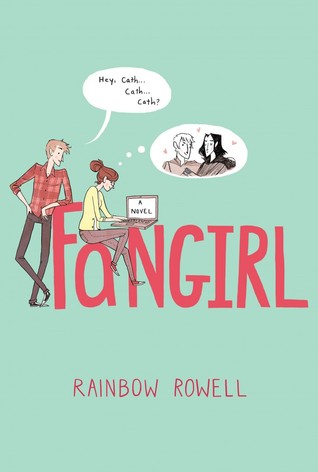 I recently read Rainbow Rowell’s Fangirl (you can read my review here.) It brought back a lot of memories for me — memories about college, because Rowell writes about the college experience (at least, the way it feels to anxious introverts) very well. And also memories about writing fan-fic.
I recently read Rainbow Rowell’s Fangirl (you can read my review here.) It brought back a lot of memories for me — memories about college, because Rowell writes about the college experience (at least, the way it feels to anxious introverts) very well. And also memories about writing fan-fic.
I “only” spent about four years of my writing life writing fan-fic, but I consider them very formative years. So even though I was writing before and after my fan-fic stint, I still think of myself as getting my “start” as a fan-fic writer. This is primarily for two reasons:
Writing fan-fic inspired me enough that it got me to actually write regularly AND finish my stories. This may be just a coincidence, since I got into writing it around the time I was getting old enough to take writing seriously (age 13). Still, I credit fan-fic with instilling in me the habit of writing every day, and seeing projects through to completion.
Writing fan-fic gave me a REAL audience for the first time. I started writing it before the Internet was widely available, but I did have a network of snail-mail pen pals in my fandom. I mailed copies of my stories to these pen pals, with a “comments” page attached to the end, and received them back with praise and feedback. Glorious!
I did submit my stories in hopes that they would be published by “official” channels, but no luck there. But then … the Internet came to rural Minnesota. And I discovered WYSIWYG webpage editors. And I set up my first fan-fiction website. I remember being so excited as I posted my accumulated stories, thinking, Who CARES if I’m not getting paid for this? People are READING my stories. This is as good as being published!!
There’s an excruciating scene in Fangirl in which the protagonist’s creative writing teacher shames her for writing fan-fiction instead of her own “original” stuff. When I was fifteen, I went to a writing camp at which the professor similarly dismissed fan-fiction. It didn’t really phase me. As an adult, I can see where these writers are coming from, and I really did want to see Cath try her hand at something from her real life in the book. There is value in creating something from “scratch,” and also in writing about the experiences that you’ve lived through.
But there is even more value in writing what you LOVE. This is where the fan-fic writers get it so right, and that is that they write for the love of their subject matter, and for the joy of writing. Yes, some fan-fiction is excruciatingly bad (including some of my own — notice that I haven’t linked to my fan-fic archive!) But who cares? It brings joy to its creator and to more readers than many traditionally published works can claim.
Fifty Shades of Gray aside, it’s true that one is unlikely to ever have a chance at traditionally publishing fan-fic, or to receive critical acclaim for it, or to ever be known outside of one’s fandom. But if a writer is okay with those limitations, what’s the problem? For me, writing fan-fic is what got me to really write. I don’t think I’m ever going back, but I wouldn’t be where I am today without it.
June 13, 2014
The Writing Pregnancy
“I could never be at peace again till I had written my charge against the gods. It burned me from within. It quickened; I was with book, as a woman is with child.” – C.S. Lewis, “Till We Have Faces”
June 11, 2014
Rumpelstiltskin, Rapunzel, and the Grief Journey
Over the weekend, this article about Rumpled was published in the Marshall Independent, my hometown newspaper. I did the interview last Monday. Beware, though: there is a spoiler in the interview (which the reporter quoted from the acknowledgements page at the END of Rumpled — I didn’t give any spoilers in my interview!)
Also over the weekend, my friend Marie sent me this post from an Irish photographer’s blog because it reminded her of Rapunzel’s tower. Absolutely gorgeous. (But for Rapunzel, a prison nonetheless, perhaps more beautiful from the outside.) Click on the image to read the complete blog post about it and to look at some more photos.
I just got back yesterday from a trip to Kentucky for my niece’s graduation. Those five days spent away from home (Friday to Tuesday) marked the first days I hadn’t cried since my cat died. Now that I’m back home and faced with her absence again, the work of grieving has returned. While I was away, my pet remembrance journal arrived. It is simple but beautifully designed and sensitively guided. I recommend it as a resource to anyone working through the loss of an animal companion, whether they consider themselves a “writer” or not. The prompts make it easy to call up memories of a pet, so it’s a good way to record an animal’s life if you might otherwise not know where to start. 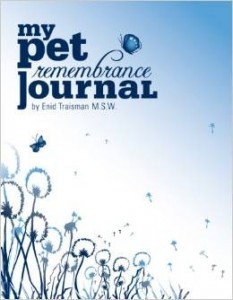 Last week I read Jon Katz’s Going Home: Finding Peace When Pets Die, and one thing he emphasized was the importance of telling stories about our pets’ lives and our relationship to them. This journal is a really wonderful tool for telling those stories. Many of the prompts conjure memories I’ve already been writing about Phoebe, unbidden, in these past weeks, but most of them I will write again. I want to have them all in one place, but also, some stories — whether fairy tales or the moments that shaped your life — are worth telling again and again.
Last week I read Jon Katz’s Going Home: Finding Peace When Pets Die, and one thing he emphasized was the importance of telling stories about our pets’ lives and our relationship to them. This journal is a really wonderful tool for telling those stories. Many of the prompts conjure memories I’ve already been writing about Phoebe, unbidden, in these past weeks, but most of them I will write again. I want to have them all in one place, but also, some stories — whether fairy tales or the moments that shaped your life — are worth telling again and again.
June 2, 2014
When You Can’t Write Around It, Write Through it
In this writing lecture by Brandon Sanderson, a woman asks how to continue writing when you’re going through something traumatic. Sanderson’s answer is a little less-than-adequate (although honest), in that he says he’s never experienced that because a) nothing very bad has ever happened to him; and b) he has a fairly small emotional range (his words, not mine!).
I wish I had been in the class so I could have raised my hand and said: “Write about your trauma.”
I’ve learned this about myself: it’s very, very hard for me to write fiction when I’m in the midst of personal transition. I stopped working on fiction when I fell in love with my husband, when I moved away from a city I loved, and during the first month or two of my marriage. Last week, my beloved cat Phoebe died, and I’ve stopped writing fiction again.
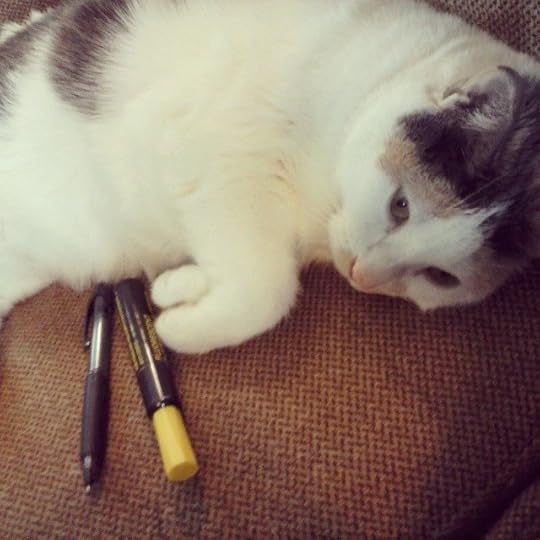
Phoebe, my favorite writing companion.
But I haven’t stopped writing.
There are moments when your real life demands all your writerly gifts. I am no longer afraid to give into these times; I know that when the dust settles, I’ll be emotionally freer to invest in my fiction again. But first, I have to invest in myself.
If you’ve never loved an animal, you may not appreciate how devastating it can be to say goodbye. But I fell away from my fiction as soon as I knew in my heart that I wouldn’t be able to save my darling girl. I stayed up late into the night the day she died, searching for resources to help me fully engage with my grief so that I could more fully heal. I ordered a pet remembrance journal, but my need was too great to wait until it arrived. So instead, I made everything into a pet remembrance journal. I posted photos and updates on Facebook. I wrote about her final moments in my Livejournal, which I hadn’t touched in months. I filled pages in my paper journal, sometimes sobbing as I did so. I emailed my best friend and another animal lover from my writers’ group, and I IM’d with a close friend who put her terminally ill cat to sleep several years ago. I texted my mom.
Today, I received Phoebe’s ashes. I’m going to put together a memorial for her, which will include photos and a goodbye letter. Creating this is helping me make meaning of this hard goodbye, and helping me feel connected to this mysterious creature who spent 10 1/2 years of my life beside me and then disappeared much too quickly. There will be more tears, but until I finish this tribute, I know I won’t be able to focus on my fiction. And that’s okay. Phoebe is worth this time, this writing, this grief.
In the first few days of letting go, when I felt sure the hurt would overcome me, my writing was a lifeline. I thought, “You will write, you will preserve her memory and all she meant to you, and you will get past this.”
It made me wonder how I would possibly cope if I weren’t a writer.
Change and loss are inevitable, and fighting them only prolongs the suffering. Instead, I use my writing to dig in deeper, and come out on the other side wiser and more at peace than I ever could have been if I’d shoved it all down for the sake of the rest of my life. Grieving takes time, and so does writing, but the two need not be at odds. Writing about trauma and transition not only keeps you writing in times where creativity may feel out of reach, but it also helps you move through the grief faster while processing it and integrating it into your life more deeply. There are many, many reasons to write, but I can think of none that matters so much as healing your own aching heart.
May 26, 2014
Retelling Book Review: Second Star by Alyssa B. Sheinmel
 Second Star by Alyssa B. Sheinmel
Second Star by Alyssa B. Sheinmel
My rating: 4 of 5 stars
There were so many things I really liked about this book. I loved the idea of the Peter Pan story being retold with the lost boys as a group of runaways hiding out in abandoned houses on the coast of California with surfing standing in for “flying.” And this setting was so incredibly vivid — the stand stuck to wet feet, the swell of the waves, the sun in your eyes. I could practically smell sand and the ocean as I read it. I found “Pete” and “Belle” to be especially well characterized, although some of the secondary characters less so. Also, the idea of Wendy finding “the lost boys” because she was searching for her brothers, who everyone else believed to be dead, stays truer to some of the darker interpretations of “Neverland” — such as that it is a place where the souls of people who died in childhood went.
All of those positives were enough for me to give this book four stars, because those parts were done so well. But there were things I didn’t like about it, too. I wanted to see Tiger Lily or some of the other more “fantastical” parts of Neverland through this new light. I wanted Nana to be described more fully — I could never picture her because the narrator never revealed her breed or any physical characteristics. I couldn’t figure out why most of the characters kept their original names (Pete, John, Michael, Wendy, Belle), but the “Hook” character was “Jas” instead of the perfectly acceptable “James.” I didn’t like that it devolved into a love triangle after the halfway point, either (seriously, is it now a REQUIREMENT for YA to feature love trianges?!?), even if the descriptions of early love were as vivid as the descriptions of sand and surf.
And then there is the ending. Ah, the ending. I really loved it … at first. It was a little ambiguous, but it threw out some intriguing possibilities that I was content to leave open. Then it tried to “have it both ways” by tossing an answer in the final couple pages, and I feel like the ending was really weakened as a result. But I’m starting to learn that other people are not nearly as tolerant of open-ended finales as I am, so the ultimate ending feels a bit to me like a forced issue. For others, it might be what redeems the book.
It gets a passing grade on the two criteria I often use to judge retellings, too, which is that it stays true enough to the original, and also brings something truly new to the table.
View all my reviews
May 21, 2014
Love, Identity, Transformation: Why I Love Retellings
Below is a copy of my guest post, which went up today on Andi’s book reviews. Visit her blog for an excerpt and more info, too.
Like many children, I grew up on fairy tales. My sisters and I wore out our “The Little Mermaid” picture book long before Disney offered its rendition. My mom, younger sister, and I all sniffled together when we finished “The Little Match Girl.” And my older sister, with a slight inclination toward the macabre, recited for me “Bluebeard” and the “real” “Cinderella” (in which the stepsisters cut off pieces of their feet). She is the one who introduced me to “Rumpelstiltskin” by acting it out in our basement playroom with Fischer Price Little People. The story captivated me so much that I would eventually go on to spend three years on my own rendition of it (Rumpled).
My inclination toward retellings started young. My older sister and I had a “writing club” which consisted of us sitting at a card table in the basement writing and illustrating stories. When I finished one, she accused it of being too close to the plot of “The Little Mermaid” (the original). She then informed me that plagiarism was against the law. Too bad I didn’t yet understand the public domain!
I read my first retellings when I was about 14, and I started with Arthurian legends. By happenstance, I started to notice that the same characters showed up in different books by different authors. The unexpected familiarity of it delighted me, as if I were meeting old friends when I entered a book rather than needing to form attachments to brand new characters. I also loved discovering what each author’s “take” on the story was: what was happening behind and between the scenes that formed the pillars of the original plot?
I didn’t attempt to write my own retellings until after I’d been reading them for about fifteen years. During that time, I was absorbing what made the best retellings: unique “angles”—something unexpected in a story the reader thinks she already knows, something that will never let the reader look at a story quite the same way again, something that makes sense of the strange turns of events in myths and fairy tales—which are, in themselves, meant to make sense of the strange turn of events of life.
I no longer worry about not being “original” enough, because now I realize that all writing really IS telling the same stories over and over again—the stories that matter most to us as human beings. Every story I’ve ever written is about transformation, about a soul on a journey to find love and identity. Every story is about someone who, after encountering certain experiences, can never be the same again.
Fairy tales hint at all the mysteries of the universe; they convey messages about the times in which they were written even as they impart themes that remain universal. By retelling these stories, we join a long and honorable tradition of keeping alive the secrets of life: love, identity, and transformation.





